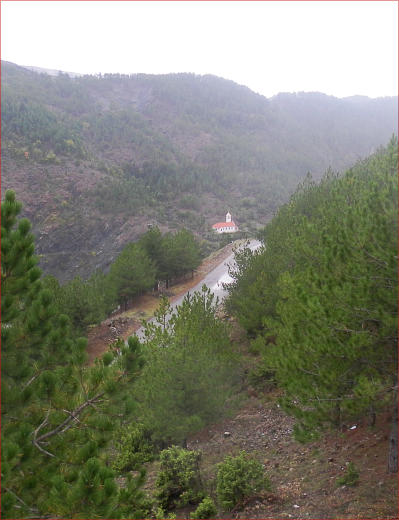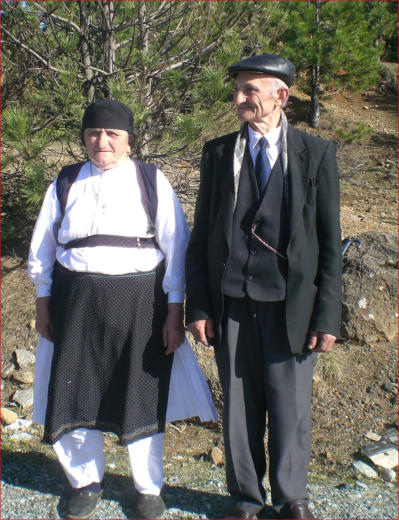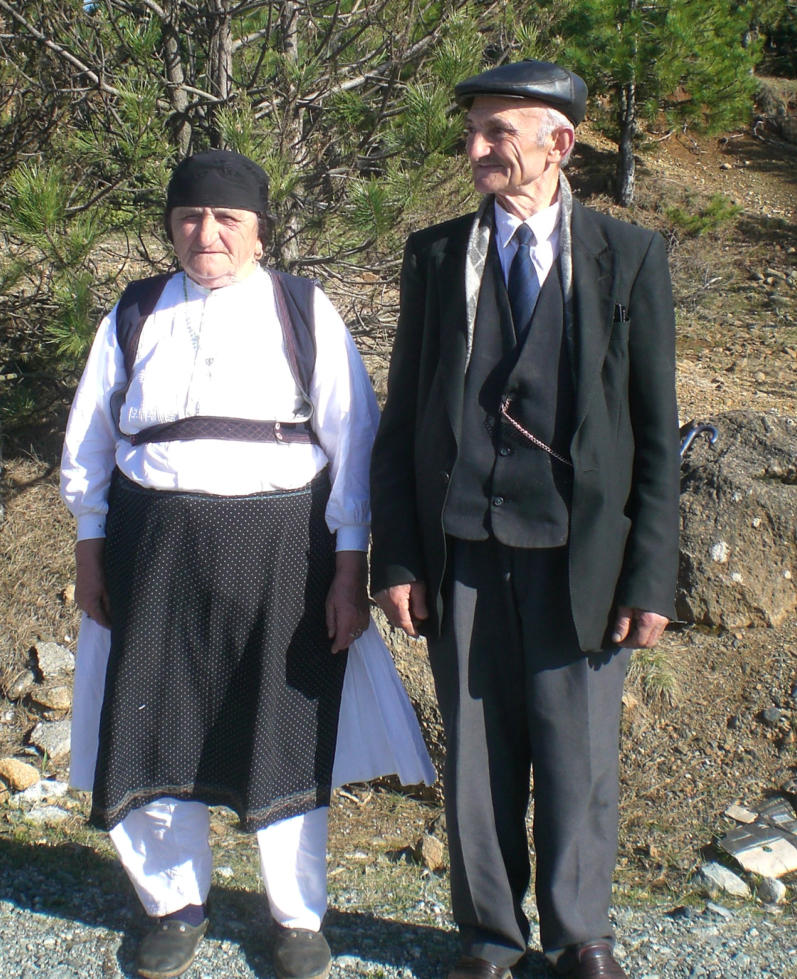
1637
Frang Bardhi:
Report on a Visit to Puka
Frang Bardhi (1606-1643) known in Italian as Francesco Bianchi, was an early Albanian church figure and author of note. He was born in Kallmet in the northern Albanian Zadrima region and studied theology in Italy. In 1636, he was appointed as Bishop of Sapa and Sarda. In June of the following year, Bardhi set out on a pastoral visit to the isolated Puka region in the mountains and reported on his journey to the Sacred Congregation of the Propaganda Fide in Rome. Report on a Visit to Puka, tribes of the Dukagjin Mountains, made in June 1637 by us, Frang Bardhi, Bishop of Sapa and Sarda and Administrator of the tribes of Pult, and sent by us to the Sacred Congregation of the Propaganda Fide that same year. Puucha [Puka] is part of the tribes of Dukagjin in Albania. They are called the tribes of Dukagjin because the well-known lords of Dukagjin ruled over them more than 200 years before the Sultan subjugated Epirus, or Albania. They ruled over them and many other surrounding peoples, such as Diberri [Dibrri] with 150 households, Mirediti [Mirdita] to the east with 200 households, Spassi [Spaçi] with 150 households that is under the jurisdiction of our diocese of Sapa, Ibali [Iballja] to the north with 140 households, and our Sadrima [Zadrima] to the south with 700 households on a fair plain. It is called Puka because a long road used by everyone for trading purposes passes through the tribes of Puka on the way to Serbia. The people have taken their name from the road. In Albanian (that is spoken in Puka and in all the above-mentioned tribal regions and places), this word Puka means a public road. But for quite some time now, the road has been closed by the Albanian Christians who have risen in revolt against the Sultan. They pillage the Muslim tradesmen. Otherwise great quantities of merchandise would come from Serbia and much would be sent from Albania to Serbia. Prominent among these Christian rebels are the men of Iballja holding out in mountain fortresses. They are under the jurisdiction of the Bishop of Sapa. The tribes of Puka are thus to be found in the high, rugged and isolated mountains, in a region with a circumference of three or more days of travel without rest, and with a length of one or more days and a width half thereof. Because I felt obliged, I wanted to visit them and, as such, I began my pastoral visit on June 5th of this year with one priest and two clerics. On the first day, we left our residence and travelled eight miles, arriving at the first village called Carma [Karma], on the western side. There we spent the night and began the next morning with the visits. The village of Karma is situated on the banks of the fair river Drin. It has 12 houses and 87 Christian souls. It has a church dedicated to Saint Alexander, of which only the walls remain, but it could hold 100 people. […] The people of Berdeti [Bardhet] have often risen against the Turks and have ambushed them on the aforementioned road that goes to Serbia through Monte Nero [Mali i Zi/Malziu] that is near the tribe of Spas. They cut them to pieces, pillaged all their goods, horses and weapons, but then made peace with the Turks by paying them tribute. As warriors, the men of Bardhet are the best in all of Puka. […] From Bardhet we went back down and arrived at the New Town of Dukagjin where I was introduced to the aga of that town. He welcomed me and invited me to stay at his house in that settlement (aga means lord and governor of a town). I accepted his invitation and he treated me very hospitably. This town was built in a large valley in the mountains, in the midst of the tribes of Dukagjin, an attractive place with very cold water that was built by a Muslim some ninety years ago, whose name I was not able to learn. He was an Albanian. It was subsequently destroyed by the Mirdita and the other tribes of Dukagjin, Christians who had risen against the Sultan at that time. Then, twenty-nine years ago, it was rebuilt, once again by a Muslim of that nationality from the town of Prizren. He was called Magaroli and was the Sanjak Bey of Dukagjin at the time. This wicked fellow, having rebuilt the town, converted many of the Christians to Islam, some by intimidating them, others with gifts, and still other with honours. In Puka, in particular, most of the people turned Turk. Even the aforementioned aga, having received a promise that he would be made the aga of the town, Catholic though he was, turned Turk at that time. They converted because of a lack of priests and preachers. Now the town is called Giutetia eree Nducagin which means New Town of Dukagjin in the Albanian or Epirotic language. It was the will of God that it was to be destroyed once again and it is falling down more and more every day. Only portions of the walls remain, that encompass eleven houses inhabited by both Christians and Muslims. The aga has three married Christian brothers and one Muslim brother who had turned Turk. The wife of the aga is a good and wise Christian woman. Around the town are six houses, some inhabited by Muslims. Neither in nor around the town was there any church or chapel. Outside the town there was just one house owned by a Christian. There I celebrated mass the following morning and preached a sermon. I held confession, administered the sacraments to a few people and confirmed 32 persons with consecrated oil. […] It was in the village of Chelcira [Kçira] that I finished my visit to Puka that lasted 16 days. Every day we visited a village on foot, sometimes walking 16 miles every afternoon. After resting at night, we continued with our visits in the morning through to lunchtime. The lunch that we were given during these visits was made of sorghum mixed with millet, badly cooked and burnt to a crisp so that it did not even look like bread. There was no other sustenance and sometimes we did not even get bread, because there was a great food shortage in those villages. In some places there was wine and in others there was not, so we often had to have lunch with cold water as there was nothing else to drink. They gave us the meat, cheese and garlic they had without charging for it. We had to sleep outside, sometimes in the wind and rain, where we lay on the ground with a little grass under us. But we managed by the grace of God in his mercy. […] Every year they celebrate their feasts and thereby do themselves much harm because, for a period of at least three days, they are obliged to offer great amounts of food and drink to everyone who attends. There are some homes that are visited during the feasts by over 200 people. The guests have a very bad habit of spending a long time at the table, beginning at lunch that is served before noon, and then sitting there the whole day and night, right through until dawn. They eat and drink, and get up only to defecate, to urinate and to vomit. They then return shamelessly to the table for more. Had I not seen this myself, I would not have believed it. It is virtually impossible to get rid of this custom. Many of these families are extremely poor and serve food that they have only received by begging. The people of Cabasci [Kabashi] do not observe the feast of Saint Paul according the Gregorian calendar. They prefer to celebrate it 11 days after the feast of Saint Paul in June because they say that the old law gives them new bread. I was obliged to point out that they must celebrate the feast on the day it occurs. They have many pagan customs. For instance, it is an ancient custom among them that when they gather or are in public places or at work, they sing out loud of the glorious deeds of their heroes, in particular of the stalwart lord George Castriota, also called Scanderbeg, and of the famed lord Lekë Dukagjini, who was their prince and ruler. They have many flocks and send the oldest men out to take care of them. They live off blueberries and there is never enough bread. But they do have a great amount of meat, cheese and fruit. There is a lack of salt, but they nonetheless eat a lot of it, and their eyes soon wear out. There is a lack of salt because they have to march for three or four days to fetch it and, sometimes the Muslims won’t let them have it. They can only get it with the secret help of Christians, because they are rebels. Almost all of the houses of Puka are covered in thatched rye, although some houses have dried pine shingles or stone slabs. The latter are the homes of the rulers and powerful families. The houses are small and underground, with usually only the roof being above ground. Many of the inhabitants eat, make fire, sleep, and keep their utensils and animals all in the same room. All of the men, young and old, wear earrings, some of silver and some of silver gilt, according to their wealth and power, and from this you can tell they are Christians, as opposed to the Muslims. They believe that the Muslims and the Muslim faith will be redeemed. As we were among Muslims at the time, I was not able to convince them publicly that this was quite wrong. The tribes of Dukagjin call their Christian leaders Chiefalia [qefali] in Albanian, which means chieftain or leader. At the neck of their shirts, these chieftains wear a silver gilt button the size of an average apple. Those who are more powerful or richer have two or three such buttons in the same place. To make themselves known as chieftains, these men wrap an embroidered silk kerchief around their heads when they travel or go out to some assembly, feast or fair. These Epirotic people and tribes are hard-working, devoted to weapons and warfare, and can easily put up with the cold, frost, heat, lack of food, and other deprivations and difficulties. Their women are healthy and very hard-working. They hoe the vineyards and do all sorts of labour. There are no immoral public women in Albania or Epirus. [...] Most of the men and women are of an average build. They are tanned by the sun because they do not wear hats, and they let their beards grow as nature would have them, but they do shave their heads, just as the Italians shave their beards. The men of Dukagjin leave a shock of hair on the top of their heads, a palm’s width or more, and some say they keep it there because, should an enemy chop their head off, he would seize the head by the shock of hair. The men consider it a stain on their honour to die of natural causes. The men who are held in greatest esteem are those who have been killed, in particular in a great battle. The people of Dukagjin are not cunningly astute, but they are courageous. No other people in the Turkish dominions of Europe would sit and speak boldly to Turkish officials while bearing arms in their sashes and in their hands as do the men of Dukagjin and the tribes of the Albanian mountains. Similarly, no other people of Europe under the Turkish yoke has been able to maintain a revolt for one hundred years, both in defence and on the attack against barbaric nations, as still do some tribes of this Albanian nation. They pride themselves on the fact that they make up 30,000 armed men. If they had a wealthy leader, they would follow him faithfully to take and destroy Constantinople and the Ottoman dynasty. But let us now return to our report. No village in Puka, as we have noted, has more than twenty houses and they are all eight, ten or fifteen miles from one another. Each of the villages has its own race [tribe] and descends from one main ancestor. As such they are related to one another to the fourth or fifth degree of consanguinity. Even if they are only related to the twentieth degree, most of them bear the same surname, as elsewhere in Albania, and maintain the same tribal identification. They never marry within the tribe. […] These tribes also have certain superstitions. They never cut anything on a Friday, not even their fingernails; they never lend anything to anyone that day; they do not wash their clothes or give cheese as alms on that day, and they observe feasts. They inspect the shoulder blade of a kid or a billy goat or a wether and predict future misfortunes, for instance whether any of them is soon to die. They can predict if it is someone in their house or in a neighbour’s house, a rich man, a poor man, or the head of the household. They also predict from the bone if they are going to be pillaged by the Turks or if the army is going to attack them. While I was on my visit to Puka, in a village called Dusgnesa [Dushneza], as mentioned above, my host slew a kid goat for dinner and, when the time came for the meal, the host took the shoulder blade of the goat, removed all the meat from it that was well stewed, and began to study it in front of me. He turned it around and looked at it in anguish. I couldn’t help myself any longer and asked him why he was staring at that bone. He groaned in reply that an army would attack them in three days’ time. I replied to this by saying that one should never look at bones like that or believe in such things. But, with the help of the Devil, it turned out just as he said, and when three days had passed, a Muslim called Mehmet Çaushi, the Aga of Lezha and an Epirot [Albanian] of Zadrima, turned up with 500 arquebusiers, almost all of whom where Albanian Christians. He pretended that they were on their way somewhere else, and set off in the night for Trebuna [Tebruna], a village near Iballja. He then set fire to the houses, took five men and women as slaves, and killed six men, three of whom were skilled fighters. He was able to do this because the people of Iballja had been caught unawares. Had a hundred of them been prepared, they would have been able to fight off the 500 soldiers. I was thus witness to the prediction that the man had made with the bone in his hand, and it turned out just as he had said. I was in the aforementioned village of Dushneza at the time of the conflict, seven miles from Iballja or, if you will, closer to poor Tebruna. When the said Çaushi passed through Dushneza in the night with his army, all the people of Dushneza, big and small, fled out of fear and as such, when day dawned, I found myself all alone there with my deacons. The arrival of the Muslim was thus the reason why I was not able to finish my pastoral visit. All I could do was to count the number of houses and inhabitants, as mentioned above. There are other superstitions they believe in, but for now, to be brief, I cannot mention them all. I will refer to them in other reports, as they occur. The people of the Albanian mountains have been in revolt against the Sultan from the time Albania was subjugated right to the present day. These people may consist of over 30,000 men. They have made peace with the Muslims of lower Albania, except the tribes of Pult, but the latter are also endeavouring to reach a peace agreement, and I think they will. Otherwise, the Turks will come with a huge army to maraud and pillage. These people say, however, that they don’t care because they killed great numbers of Turks every time they were attacked. Indeed, only a few years ago, they killed the Sanjak Bey who was leading the army. […] [Extracts from the report of Frang Bardhi [Francesco Bianchi], Relation della visita di Puucha, populi nei Monti di Ducagini, fatta nel mese di Giugno l’anno 1637, da Noi Francesco Bianchi, Vescovo Sappatense e Sardanense, et Administrator de Populi Pulatensi e da Noi mandata alla Sac. Cong. de Prop. fide nell’istesso anno. Archives of the Propaganda Fide, Visite e Collegi 16, p. 194-200. Reprinted in: Peter Bartl (ed.), Albania Sacra, 3 (Wiesbaden 2014), p. 118 129; and in Injac Zamputti (ed.), Dokumente për historinë e Shqipërisë (1623-1653) (Sankt Gallen & Prishtina 2015), p. 174 184. Translated from the Italian by Robert Elsie.]




Church of Gomsiqja in the district of Puka
(photo: Robert Elsie, October 2013).


Couple from Qerret in the district of Puka
(photo: Robert Elsie, October 2013).

| Robert Elsie | AL Art | AL History | AL Language | AL Literature | AL Photography | Contact |


